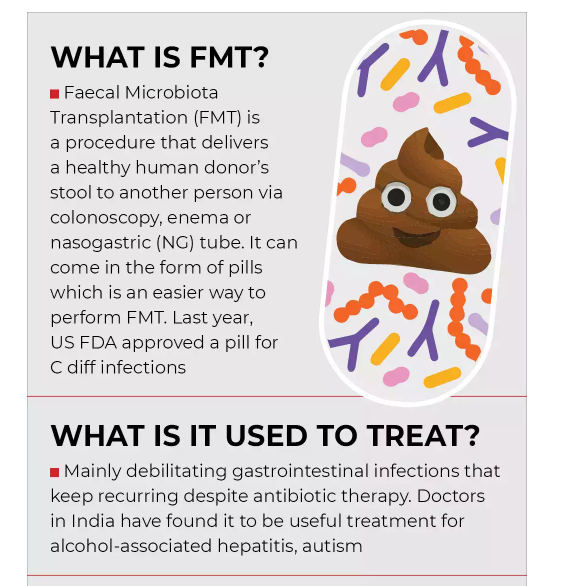Important Facts For Prelims
Fecal Microbiota Transplantation
- 13 Sep 2024
- 4 min read
Why in News?
The concept of using fecal matter as a medical treatment, known as fecal microbiota transplantation (FMT), has gained attention as a game-changer for treating gut disorders, despite its initial unsettling nature.
- India has made progress in this field, and the treatment is reshaping lives, though it still faces challenges.
What is Fecal Microbiota Transplantation?
- About: FMT involves the transfer of fecal material from a healthy donor into the gastrointestinal tract of a patient with an imbalanced or unhealthy gut microbiota.
- The primary goal is to repopulate the recipient’s gut with beneficial bacteria from the donor, helping to restore a healthy microbiome and improve gut health.
- Benefits: The human gut is home to a diverse community of microorganisms that play crucial roles in digestion, immune function, and protection against harmful pathogens.
- FMT helps to correct disruptions in the gut microbiome, often caused by factors such as antibiotics, steroids, or infections like Clostridium difficile (a bacterium that can cause diarrhoea, colitis, and serious bowel problems).
- By introducing healthy bacteria, FMT aims to restore balance and enhance overall gut function.
- Challenges and Limitations: FMT is not yet regulated by central health authorities like the Indian Council of Medical Research (ICMR), which raises concerns about standardisation and safety.
- The process requires stringent donor screening to avoid risks, including infectious diseases and microbiome diversity.
- The 'yuck' factor linked with fecal material remains as a barrier for many patients, despite the treatment's efficacy.
- Future of FMT: Researchers stress that more studies are needed to fully understand the role of microbiomes and establish FMT as a standard care practice.
- Trials and studies are essential to refine protocols and ensure the safety and effectiveness of FMT. Comprehensive guidelines and protocols are needed to standardise the practice and address ethical concerns.
Gut Microbiota
- It refers to the vast collection of trillions of microorganisms, including bacteria, viruses, fungi, and protozoa, that inhabit the human gastrointestinal tract. This diverse community plays a crucial role in maintaining overall health and supporting various bodily functions.
- It helps in breaking down complex food components and produces essential vitamins like B12 and K. Beneficial microbes prevent harmful bacteria from colonising the gut.
- Metabolism & Energy Balance: Influences fat storage, energy absorption, and has links to obesity, metabolic disorders and including Autism.
- Gut-Brain Connection: Affects mood and mental health through the gut-brain axis, linked to anxiety and depression.
UPSC Civil Services Examination Previous Year Question (PYQ)
Prelims
Q. Consider the following statements in respect of probiotics:
- Probiotics are made of both bacteria and yeast.
- The organisms in probiotics are found in foods we ingest but they do not naturally occur in our gut.
- Probiotics help in the digestion of milk sugars.
Which of the statements given above is/are correct?
(a) 1 only
(b) 2 only
(c) 1 and 3
(d) 2 and 3
Ans: (c)
Exp:
- Probiotics are a combination of live beneficial bacteria and/or yeasts that naturally live in your body. Bacteria is usually viewed in a negative light as something that makes you sick. Hence, statement 1 is correct.







